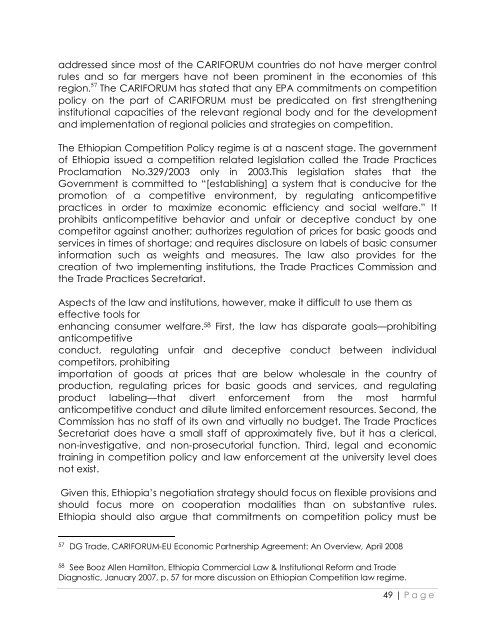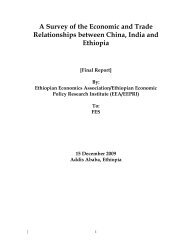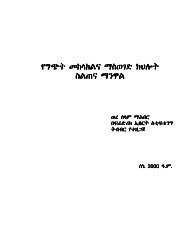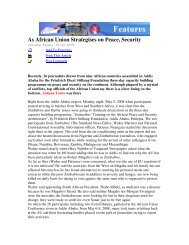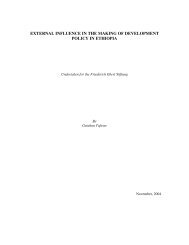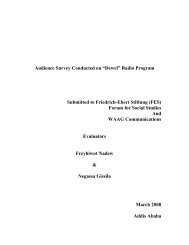Ethiopia and EPA Negotiation 2008 - FES Ethiopia
Ethiopia and EPA Negotiation 2008 - FES Ethiopia
Ethiopia and EPA Negotiation 2008 - FES Ethiopia
Create successful ePaper yourself
Turn your PDF publications into a flip-book with our unique Google optimized e-Paper software.
addressed since most of the CARIFORUM countries do not have merger control<br />
rules <strong>and</strong> so far mergers have not been prominent in the economies of this<br />
region. 57 The CARIFORUM has stated that any <strong>EPA</strong> commitments on competition<br />
policy on the part of CARIFORUM must be predicated on first strengthening<br />
institutional capacities of the relevant regional body <strong>and</strong> for the development<br />
<strong>and</strong> implementation of regional policies <strong>and</strong> strategies on competition.<br />
The <strong>Ethiopia</strong>n Competition Policy regime is at a nascent stage. The government<br />
of <strong>Ethiopia</strong> issued a competition related legislation called the Trade Practices<br />
Proclamation No.329/2003 only in 2003.This legislation states that the<br />
Government is committed to “[establishing] a system that is conducive for the<br />
promotion of a competitive environment, by regulating anticompetitive<br />
practices in order to maximize economic efficiency <strong>and</strong> social welfare.” It<br />
prohibits anticompetitive behavior <strong>and</strong> unfair or deceptive conduct by one<br />
competitor against another; authorizes regulation of prices for basic goods <strong>and</strong><br />
services in times of shortage; <strong>and</strong> requires disclosure on labels of basic consumer<br />
information such as weights <strong>and</strong> measures. The law also provides for the<br />
creation of two implementing institutions, the Trade Practices Commission <strong>and</strong><br />
the Trade Practices Secretariat.<br />
Aspects of the law <strong>and</strong> institutions, however, make it difficult to use them as<br />
effective tools for<br />
enhancing consumer welfare. 58 First, the law has disparate goals—prohibiting<br />
anticompetitive<br />
conduct, regulating unfair <strong>and</strong> deceptive conduct between individual<br />
competitors, prohibiting<br />
importation of goods at prices that are below wholesale in the country of<br />
production, regulating prices for basic goods <strong>and</strong> services, <strong>and</strong> regulating<br />
product labeling—that divert enforcement from the most harmful<br />
anticompetitive conduct <strong>and</strong> dilute limited enforcement resources. Second, the<br />
Commission has no staff of its own <strong>and</strong> virtually no budget. The Trade Practices<br />
Secretariat does have a small staff of approximately five, but it has a clerical,<br />
non-investigative, <strong>and</strong> non-prosecutorial function. Third, legal <strong>and</strong> economic<br />
training in competition policy <strong>and</strong> law enforcement at the university level does<br />
not exist.<br />
Given this, <strong>Ethiopia</strong>’s negotiation strategy should focus on flexible provisions <strong>and</strong><br />
should focus more on cooperation modalities than on substantive rules.<br />
<strong>Ethiopia</strong> should also argue that commitments on competition policy must be<br />
57<br />
DG Trade, CARIFORUM-EU Economic Partnership Agreement: An Overview, April <strong>2008</strong><br />
58<br />
See Booz Allen Hamilton, <strong>Ethiopia</strong> Commercial Law & Institutional Reform <strong>and</strong> Trade<br />
Diagnostic, January 2007, p. 57 for more discussion on <strong>Ethiopia</strong>n Competition law regime.<br />
49 | P a g e


